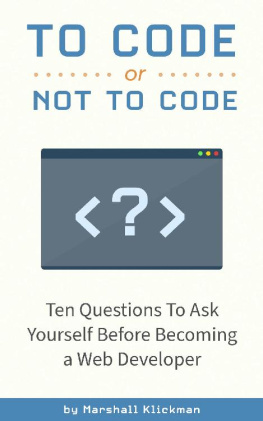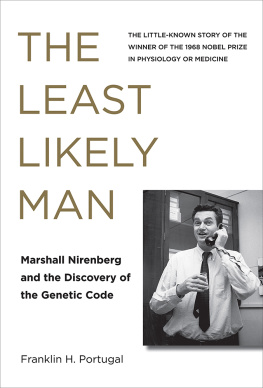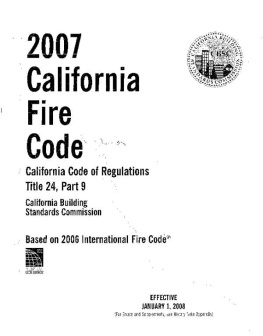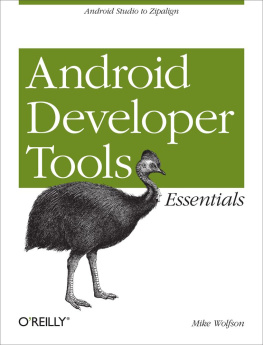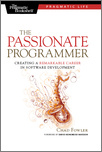Marshall Klickman - To Code or Not To Code?: 10 Questions To Ask Yourself Before Becoming a Web Developer
Here you can read online Marshall Klickman - To Code or Not To Code?: 10 Questions To Ask Yourself Before Becoming a Web Developer full text of the book (entire story) in english for free. Download pdf and epub, get meaning, cover and reviews about this ebook. year: 2020, genre: Romance novel. Description of the work, (preface) as well as reviews are available. Best literature library LitArk.com created for fans of good reading and offers a wide selection of genres:
Romance novel
Science fiction
Adventure
Detective
Science
History
Home and family
Prose
Art
Politics
Computer
Non-fiction
Religion
Business
Children
Humor
Choose a favorite category and find really read worthwhile books. Enjoy immersion in the world of imagination, feel the emotions of the characters or learn something new for yourself, make an fascinating discovery.
- Book:To Code or Not To Code?: 10 Questions To Ask Yourself Before Becoming a Web Developer
- Author:
- Genre:
- Year:2020
- Rating:5 / 5
- Favourites:Add to favourites
- Your mark:
- 100
- 1
- 2
- 3
- 4
- 5
To Code or Not To Code?: 10 Questions To Ask Yourself Before Becoming a Web Developer: summary, description and annotation
We offer to read an annotation, description, summary or preface (depends on what the author of the book "To Code or Not To Code?: 10 Questions To Ask Yourself Before Becoming a Web Developer" wrote himself). If you haven't found the necessary information about the book — write in the comments, we will try to find it.
Marshall Klickman: author's other books
Who wrote To Code or Not To Code?: 10 Questions To Ask Yourself Before Becoming a Web Developer? Find out the surname, the name of the author of the book and a list of all author's works by series.
To Code or Not To Code?: 10 Questions To Ask Yourself Before Becoming a Web Developer — read online for free the complete book (whole text) full work
Below is the text of the book, divided by pages. System saving the place of the last page read, allows you to conveniently read the book "To Code or Not To Code?: 10 Questions To Ask Yourself Before Becoming a Web Developer" online for free, without having to search again every time where you left off. Put a bookmark, and you can go to the page where you finished reading at any time.
Font size:
Interval:
Bookmark:
To Code or Not to Code?
10 Questions To Ask Yourself Before Becoming a Web Developer
by Marshall Klickman
Table of Contents
Welcome!
1992 was a very big year for my career, which seems odd, since I was only seven years old. While I wouldnt actually write my first line of code until almost fifteen years later, that was the year that my dad came home with some new thing, called a modem, that plugged into the computer (and also the phone?). It also came with a disk that said America Online. I could tell it obviously wasnt a game, so I figured it was just another boring grown-up thing. I also had no idea why my dad got so visibly excited when the computer made all these weird buzzing and beeping noises, and the little graphic of the two plugs went from disconnected to connected.
To quote Ben Wyatt of Parks and Recreation, I dont get it. At all.
Despite my indifference at the time, that little box continued to have an impact on not just my life, but on the world itself. As the years passed, I watched the internet grow from this new technology that was just a distraction from real life into a truly foundational part of our society, one to which I owe much gratitude for allowing me to provide for my family and myself by doing something I enjoy.
And here you are, more than likely hoping to do the same thing with your life. But as with all new frontiers, the unknown brings with it some very real risks. As fun and lucrative a profession as a web developer may seem, there is very often a disconnect between what you think a job will be like, and what its actually like. A very smart person once told me, the best way to minimize your risk with something is to maximize your knowledge of it, and thats what Im hoping to help you do.
Please know that the questions ahead are not exhaustive, nor are they absolute qualifiers for whether you will be good at web development or not; only you can determine that. They are moreso designed to expose certain aspects of what its like to do web development, by highlighting parts of the job that may not be obvious, even after doing it yourself for a while. So whether you get to the end and say, ok, sign me up! or I would rather eat raw sardines with a rusty fork, as long as you have a higher sense of clarity to make that distinction, then Ive done my job.
So, in the immortal words of the highly-compressed voice recording that greeted you upon signing into America Online, Welcome!
Question #1:
Are you detail oriented?
I know, you probably hate this question. Youve most likely seen it on almost every job application youve ever laid eyes on, and while it may be a valid question, it feels like its become more than just a little cliche. That being said, if youre considering web development, you will need to be comfortable sweating the small stuff.
Heres the thing about computers: they do exactly what you tell them to. This sounds great at first, until you realize just how specific you have to be when giving them instructions. When you ask a human being to pass you the salt, they can just figure out all the steps to do that on their own. You dont have to say, Hey, could you extend your arm, open your hand, grab the salt with that hand, pull your arm back, stand up, walk to me, extend your hand, place the salt into my hand, and let go? When you give instructions to a computer, however, thats exactly what you need to do.
Since web development is just thatgiving instructions to a computer on what to display on the screen and how it should workyou have to be just as specific. When youre writing code for the web, just one character out of place can break your entire design (and thankfully, putting that one character back into place can magically fix it again). Sure, there are tools to help warn you when something is not where it should be, but when those tools dont work as theyre supposed to (because none of them are fool-proof), being able to spot that one misspelled word becomes an invaluable skill.
And dont worry; you dont have to be able to spot that error at first glance. Sometimes it takes a little bit of timeand diligenceto sift through a few dozen lines of code before you find the culprit. As long as you have the patience to take it slow and really look (Ive skimmed over the same misspelled variable name more times than Id care to admit), then youve got nothing to worry about.
Question #2:
Are you able to see things from the users perspective?
Merriam-Webster defines empathy as the ability to understand and share the feelings of another. If you do a Google search for empathy in web design, you will have about 39.9 million results to sift through (yes, I actually checked), and most of the articles youll come across are written by people who are very passionate about creating things on the web that take actual human feelings into account. While it may be easytempting, evento boil web development down to a purely technical discipline, this would be, as my Uncle Phil used to say, sheer folly.
The point of making things on the web is to make them for people. And not just for the end user as we call them, but everyone who will interact with your code, website, or app along the way: other developers, project managers, even (and maybe especially) designers who are contributing to your project. No matter how psyched I can get about the nerdy, technical details of something Im working on, the most rewarding projects Ive ever done have been the ones that make an actual impact on other people, even if its something as simple as seeing them smile when they click that one button.
I should clarify something: its not just about adding fun little easter eggs that make people giggle (which are still great), but more importantly its about knowing what will frustrate, annoy, and mentally tax a person using your product and how to avoid those pitfalls. As youre building something, if you can constantly picture how someone will feel while using it, you will end up with that much better of an end result. And not just how you, the web developer with a 4k monitor and blazing-fast wired internet connection and no interruptions, will feel using it. How will this feel to the mom of three, getting her kids ready for school and trying to check the weather on her old iPhone 5C with no wifi because she just moved in yesterday? If you can start asking yourself those questions, then youll be all the better for it.
Question #3:
Are you comfortable working alone, possibly for long periods of time?
You dont have to go very far to find someone who thinks that all developers are extremely shy introverts, who purposely avoid all eye contact in public places, and start hyperventilating at the thought of talking to a stranger. And while that may be a slightly hyperbolic example of the developer/programmer stereotype, its also not that far from the truth. There is definitely a strong correlation between being introverted and having a bent towards a more technical, solitary line of work.
Regardless of how comfortable or uncomfortable you are with being around and communicating with other people, working solo is a necessary part of the job. Theres a good chance you already have a tendency to relish those times of solitude, where its just you, a cup of coffee, and a good book. That natural desire to want to put on headphones and shut the world out so you can be alone with your thoughts will translate very nicely to this line of work.
Ok, I can already see some of you extroverts heading for the exits, but hear me out! You do not have to be introverted to be a good developer; there are just a lot of natural parallels between the nature of development work and the things that introverts find appealing. As long as youre ok with sitting still and quiet long enough to focus on what youre doing, then you have nothing to worry about. And if youre really engaged in whatever it is youre building, then chances are you wont even notice that youre doing introvert things.
Next pageFont size:
Interval:
Bookmark:
Similar books «To Code or Not To Code?: 10 Questions To Ask Yourself Before Becoming a Web Developer»
Look at similar books to To Code or Not To Code?: 10 Questions To Ask Yourself Before Becoming a Web Developer. We have selected literature similar in name and meaning in the hope of providing readers with more options to find new, interesting, not yet read works.
Discussion, reviews of the book To Code or Not To Code?: 10 Questions To Ask Yourself Before Becoming a Web Developer and just readers' own opinions. Leave your comments, write what you think about the work, its meaning or the main characters. Specify what exactly you liked and what you didn't like, and why you think so.

